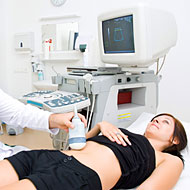- General Articles
- General Pregnancy Questions
- Baby Growth
- Pregnancy Diet
- Miscarriage
- During Pregnancy
- Twin Pregnancy
- Toddler Meals
- Home Remedies During Pregnancy
- Breastfeeding
- Pregnancy Week By Week
- Pregnancy Tests
- Ectopic Pregnancy
- Pregnancy Signs and Symptoms
- Pregnancy Stages
- Potty Training
- Fetal Development
- Preschooler
- Postpartum Depression
- Toddler Illness
- Baby Care
- After Pregnancy
- Molar Pregnancy
- During Delivery
- Beauty and Style
- Pregnancy Clothing
- Preconception
- Fertility
Relation between Obesity and Infertility
The incidence of obesity is on the rise in the United States, with almost 35% of all adults being classified as obese. Obesity increases the risks of developing several disorders including heart disease, hypertension, diabetes, gallbladder disease, respiratory disorders, cancer and infertility.
Obesity is determined by body mass index or BMI. This is an individual’s height to weight ratio. Individuals with a BMI between 25 and 29. 9 are considered to be overweight, while those with a BMI of 30 or more are considered to be obese.
A BMI of 40 and above indicates extreme obesity.
Another measure of obesity is the waist to hip ratio. A high ratio indicates that fat is concentrated around the waist, putting the individual at an increased risk of developing serious health issues. Healthy ratios for men should be 0.9 or less while for women the healthy ratio is 0.8 or lower.
The relationship between obesity and infertility is a well documented one. Any type of abnormal weight affects an individual’s health, be it obesity or being underweight. Abnormal weight is usually brought about by eating disorders. Obesity has been linked to excessive eating and sedentary lifestyles and is known to affect fertility levels in both men and women.
Obese Woman and Infertility
The size of a woman’s body has been linked to several gynecological disorders and infertility is just one of them. Infertility has been linked to both overweight and underweight women. The extent to which being severely underweight or overweight increases the risk of infertility remains unknown. Studies have shown that women who are overweight or obese are at increased risk of developing menstrual disorders such as amenorrhea that cause infertility. In many cases of overweight and infertile women, it has been observed that weight loss with the help of diet and exercise plans can restore ovulation.
Studies have shown that the risk of primary ovulatory infertility in women increase from 2.4 in the case of women with BMI between 20 to 24.9, to 3.1 in the case of women with BMI of 27. The risk increased even further at higher BMIs.
Furthermore, it is not just obesity in adulthood that can affect fertility levels. There is statistical evidence to show that obesity at the ages of both 7 years and 23 years increased a woman’s chances of developing menstrual irregularities by the age of 33. Being overweight or obese during early adulthood may also increase the risks of developing menstrual irregularities and sub fertility.
Obese Man and Infertility
Studies conducted by researchers at the Harvard School of Public Health have found that overweight and obese men are more likely than men of normal weight to have a low or nil sperm count. Obese men were 42% more likely to have low sperm count than men of normal weight and 81% more likely to produce no sperm at all. However, more studies are required to find out whether the lowered sperm count is caused by obesity and not some other underlying health issue.
Get Rid of Obesity
Prevention is always better than cure and it is far easier to prevent ones' self from gaining weight than it is to lose weight. The best way to prevent obesity is to eat a healthy diet and to exercise regularly. In fact, it is the only healthy way to lose weight and to bring your BMI down to normal healthy levels.
The Centers for Disease Control and Prevention recommends at least half an hour of aerobic activity such as brisk walking for at least 5 days in a week. This figure can be gradually increased as your body adjusts to the new regimen. Muscle building exercises should gradually be introduced into your routine.
Dietary changes are also essential if you are to lose weight. Some of these changes include:
- Limit your calorie intake
- Eat plenty of whole grain cereals, fruits and green vegetables
- Stop eating fried & fatty foods and junk food
- Avoid excessive salt in your food
- Avoid eating red meat
- Avoid drinking alcohol
You should always consult your doctor or a nutritionist before implementing any dietary changes.
Apart from diet and exercise, there are certain medications that may help promote weight loss. However, these medications should only be taken if advised to do so by a doctor as they may have some serious side effects. There are certain surgical options also available such as gastric bypass and liposuction but again, these should only be resorted to in case all other methods have failed.
Read more articles from the Fertility Category.



 7 Must-Haves Before Your Baby Arrives
7 Must-Haves Before Your Baby Arrives Bonding Games for Babies
Bonding Games for Babies DIY Baby Bath Towel Apron
DIY Baby Bath Towel Apron Common Late Pregnancy Fears
Common Late Pregnancy Fears